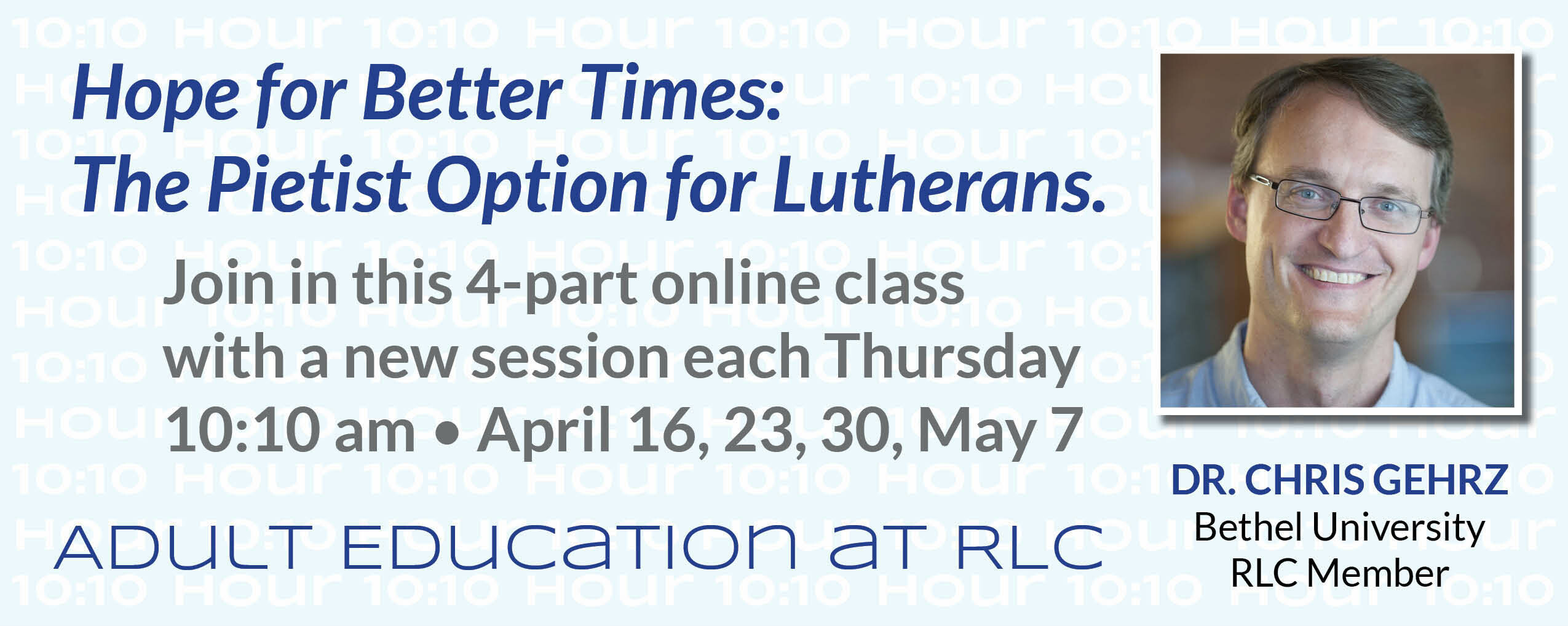Contact Us
- Phone: 651.487.7752
- Email:
- Mailing Address: 1215 Roselawn Ave. West | Roseville, MN 55113


One of the most important impulses in the modern history of Christianity is Pietism, which began as a renewal movement in German Lutheranism, spread to the Lutheran churches of Scandinavia, and shaped the development of several Lutheran bodies in America. Yet most Lutherans and other Christians today know nothing of Pietism — or only know it as something to be avoided.
In this four-part online presentation, historian Chris Gehrz will suggest how the Pietist past can inspire renewal amid the challenges of the present.
In part one of this series, Chris suggests that Christians can better understand who they are — and who they're becoming — by better understanding who they've been. Like many other followers of Jesus Christ, Lutherans can find some of their religious heritage in the history of Pietism, whose founders grew up in the wake of a crisis worse than COVID, yet had an unshakable "hope for better times."
Part Two: What is Pietism? "In North America," argues theologian Roger Olson, Pietism "became the dominant form of Protestantism... the grassroots form of religion" in the United States in the 18th and 19th centuries. Yet most American Christians today either don't know the words "Pietism" or "Pietist," or associate negative connotations with them.
In part two of this series, Chris defines Pietism as a religious ethos found in Lutheranism and other Christian traditions, a set of instincts about our relationships with God and each other, the transformative experience of faith, and hope for better times.
Chris Gehrz and Mark Pattie, The Pietist Option: Hope for the Renewal of Christianity (InterVarsity Press, 2017), https://www.amazon.com/Pietist-Option...
Roger Olson and Christian Collins Winn, Reclaiming Pietism: Retrieving an Evangelical Tradition (Eerdmans, 2015), https://www.amazon.com/Reclaiming-Pie...
Christian Collins Winn, Chris Gehrz, et al., The Pietist Impulse in Christianity (Pickwick, 2011), https://wipfandstock.com/the-pietist-...
As we round the bend in this four-part series, we delve into the history of specific Pietist movements.
The first Pietists were German Lutherans — who were often critical of the Lutheran churches of their time. That same tension followed Pietism north to Scandinavia, where revivalists like Hans Nielsen Hauge had complicated relationships with Lutheran state churches. Then as millions of Scandinavian immigrants crossed the Atlantic, they separated into new American denominations, one of which embraced its Pietist heritage more than any other.
Chris Gehrz, “Philipp Jakob Spener,” Christianity Today, Apr. 26, 2019, https://www.christianitytoday.com/his...
Chris Gehrz, “Stay With Us: The Pietism of Hans Nielsen Hauge,” The Anxious Bench, Nov. 27, 2018, https://www.patheos.com/blogs/anxious...
Peter Vethanayagamony, "Henry Melchior Muhlenberg," Living Lutheran, Oct. 2018, https://www.livinglutheran.org/2018/1...
Tim Frakes, God's Glory, Neighbor's Good: The Story of Pietism (Vision Video, 2017), https://www.amazon.com/Gods-Glory-Nei...
Mark A. Granquist, ed., Scandinavian Pietists: Spiritual Writings from 19th-Century Norway, Denmark, Sweden, and Finland (Paulist Press, 2015), https://www.amazon.com/Scandinavian-P...
Mark Safstrom, ed., The Swedish Pietists: A Reader (Pickwick, 2015), https://wipfandstock.com/the-swedish-...
Tom Tredway, "Covenanters, Lutherans, and Creeds," Pietisten, Spring/Summer 2014, http://pietisten.org/xxix/1/creeds.html
Douglas Shantz, An Introduction to German Pietism: Protestant Renewal at the Dawn of Modern Europe (Johns Hopkins University Press, 2013), https://www.amazon.com/Introduction-G...
Michelle A. Clifton-Soderstrom, Angels, Worms, and Bogeys: The Christian Ethic of Pietism (Cascade, 2010), https://wipfandstock.com/angels-worms...
In the conclusion of our series, Chris suggests how Pietism can help Lutherans and other Christians to love God and love neighbor. Topics include ministries of compassion and justice, the challenge of Christian unity, the Bible as means of relationship with God, and the power of spiritual stories and music.
Further Reading and Viewing for Part Four
• Chris Gehrz and Mark Pattie, The Pietist Option: Hope for Better Times (InterVarsity Press, 2017), https://www.amazon.com/Pietist-Option...
• Chris Gehrz, “The Tender, Gracious God of My Favorite Hymn Writer,” The Anxious Bench, Oct. 2, 2018, https://www.patheos.com/blogs/anxious...
• Roger Olson, “Pietism: A World We Have Lost,” Aus Memorial Lecture, Luther Seminary, March 15, 2011, https://www.youtube.com/watch?v=dxK7m...
• The Life of Lady Johanna Eleonora Petersen, Written by Herself, trans. Barbara Becker-Cantarino (University of Chicago Press, 2005), https://www.amazon.com/Johanna-Eleono...
• Paul P. Kuenning, The Rise and Fall of American Lutheran Pietism: The Rejection of an Activist Heritage (Mercer University Press, 1989), https://www.amazon.com/Rise-Fall-Amer...
• Evangelical Covenant Church, "Biblical Authority and Christian Freedom" (1963), http://collections.carli.illinois.edu...